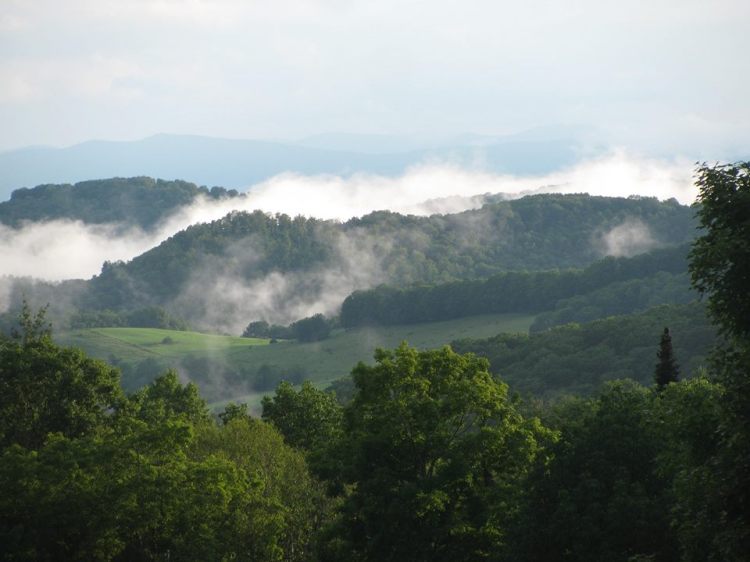The below is a reasonably polished draft of my personal statement for the Fulbright Scholarship Program, specifically their English Teaching Assistantship–an opportunity almost impossible to attain, but too gleaming to pass up. It would place me in a German school for a year, teaching English to high school students, with a full stipend and time for outside research and study. And doors opened to me for further study in the United States or abroad. I can’t not try. The photograph is taken from my front porch.
In his Glasperlenspiel, Hermann Hesse defines vocation as a Call and an Admonition. It is a Call, he writes, because to experience one’s vocation is first to experience a summons from without, whether in the form of an idea, event, or another human being. This meeting of self and the world, he continues, brings with it an Admonition–the one called now has a charge to make good on it, to reach out to others as he or she was once reached out to. Vocation is both a gift and a commandment, and as such has the power to shape a career and a life.
My vocation is to teach. I define the word in its broadest sense: to share knowledge, to bring into dialogue and create conversation, to give others something that will shake them up and force them to see the world in a slightly different way. To engage in the pursuit of knowledge with the goal of giving it all back one day.
I’ve always had the passion, I think, though things were once more complicated. Homeschooled on a mountain farm in Vermont, I had few opportunities in highschool to engage in the sort of intensive academic dialogue I was looking for. I grew up surrounded by a supportive family and exhilaratingly lovely physical space, but my intellect was a closed loop–impatient, grasping, restless. Though I listened and talked and read, my desire to teach had nowhere to go.
Still, I tried. I hosted a series of “Symposiums” for siblings and family members, where I delivered pretentiously-titled lectures on joy in Nietzsche and early psychoanalysis. I read books my parents would not have approved of, and then blew my cover because I had to talk about them. I found online forums where I could write page-long posts about stage production in German opera. Outside of school, I led tours and taught fiber arts classes on our farm to hundreds of children and adults from around the world. But it wasn’t enough—by my senior year I was making myself crazy with excess intellectual energy, on the edge of serious depression and academically horribly lonely.
After all of that, stepping onto my college campus was like stepping into the sun. This was Hesse’s Call—suddenly there were hands reaching out, pulling me alongside, giving me a place to stand and more opportunities than I could take advantage of. The intellectual dialogue that had existed for me only in the ideal world became suddenly vital, something I could take hold of as a career and a future.
It was at college, then, that I fell fully in love with teaching. Today, as a rising senior I have my own third-grade Latin classroom at a local Preparatory School, spend my evenings working in the Writing Center, hash out adjective endings and coach oral exams as a German tutor. I take students to the opera and talk about politics and music, sit on undergraduate conference panels on Greek tragedy or 20th century Germany. A professor told me last semester, “Don’t go into teaching unless you have a fire in your belly.” I do, I said, and this is where I want to be.
And what about the future? I hope to continue my studies and someday teach at the college level. Wherever I end up, however, education will always be for me as much a career as a life philosophy. Firstly, because I have always found that teaching, along with being an artist, is of all the professions the most hopeful: it begins with the understanding that there is something in mankind worth passing on, and those worth passing it on to. That, to me, is the root of all humanism, of all true creation and scholarship. And secondly, because the worldview behind education leaves so much room for awe, curiosity, and humility. There is something both incredibly humbling and beautiful about working with the human mind, about seeking to unlock its potential for admiration and understanding.
Above all, though, I want to teach because of the second part of Hermann Hesse’s definition–the Admonition, the commandment. For me, it’s not enough just to be grateful to those professors who sought me out when I was very much alone. I want to offer something in return for their investment. And so I would be honored for the chance to reach out to other young people, to talk to them, to let them speak when they are trying to say something. In the end, teaching does not just or even primarily have to do with imparting knowledge–it is also about giving others the tools they need and the opportunity to articulate a voice.
This, I think, is what it means to make the pursuit of knowledge unrelentingly, magnificently personal.
